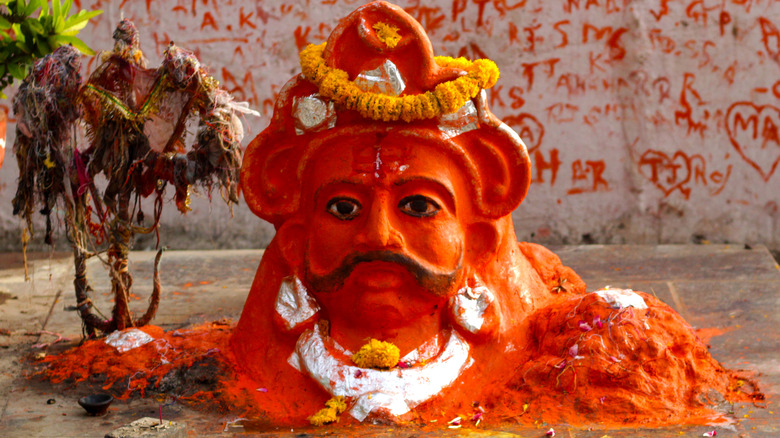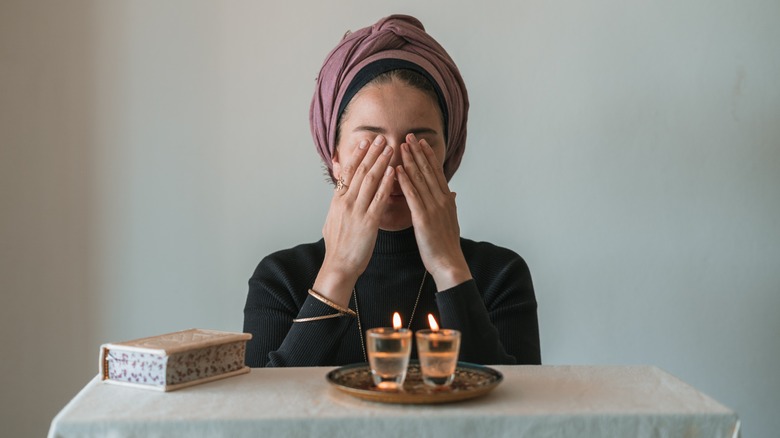Why Women In Some Cultures Never Cut Their Hair On A Saturday
From the daring modern shag to the TikTok-famous curtain bangs, hair plays a huge part in today's pop culture. Hairstyles are a form of self-expression and can signify everything from your musical interests to your personality type. However, for many women around the globe, their hair is more than just an expression of personal identity; rather, the way they wear their hair — whether short, long, covered, or free-flowing — is an expression of a commitment to their faith.
In Rastafarian communities, it's a tradition for women to wear their hair in long dreadlocks, while Sikh women will often wear their hair long in accordance with the "five specific principles" (via Allure). However, there is a place in many faith communities for women who prefer to wear their hair in short styles or, at the very least, like to take the scissors to their dead ends every now and then.
Interestingly, one thing that unites many religions around the world is that, even if haircuts are allowed, they often discourage female followers from cutting their hair on Saturdays. From Hindu astrology to early Christianity, different faith communities have explained their dislike of Saturday haircuts in different ways, including pointing to the power of the planets to recognizing Saturday as a sacred holy day.
Some believe it brings bad luck
In Hindu culture, cutting your hair or nails on a Saturday is believed to bring bad luck (via Exametc). This also extends to shaving facial or body hair (via Hinduism Facts). To explain how this belief came to be, it's important to highlight that Hinduism is a polytheistic faith. According to Learn Religions, Hindus worship multiple gods and recognize over a thousand deities within their pantheon. These separate gods and goddesses are understood to represent different aspects of Brahman, also known as "the Supreme Absolute."
To put it simply, Hindu culture celebrates various deities while also recognizing that all of these deities must work together to make up the beautiful, complex world that we live in. In this particular case, it is Lord Shani — also known as Sani, Shani Dev, Sani Maharaj, and Chayyaputra — who is said to be angered when one of his followers cuts their hair or nails on a Saturday (via Exametc). As each Hindu deity possesses certain powers, Shani is said to be the god of justice and fortune. The connection to Saturday can be explained by the fact that "Shanivara is the Hindu name for Saturday" (via Learn Religions). Therefore, it is believed that snipping your locks, shaving, or cutting your nails on Lord Shani's holy day will not end well, with the god of justice not looking kindly upon this sign of disrespect.
In Hindu astrology, Saturday is the day of Saturn — the planet that brings misfortune
Hindu astrology also tells us that Saturday is the day of the planet Saturn. As one of the nine planetary gods — otherwise known as the Navagraha — Lord Shani is recognized as an extension of the planet Saturn (via Learn Religions). Like the Hindu deities, the planets are also aligned with certain powers and days of the week.
Let's say you're nervous about making a big purchase. Thursday is considered a good day for big decisions like this, as it's believed to be the day of Jupiter, which rules wealth, children, and knowledge (via AstroSage). Monday, on the other hand, is the day of the moon. A sensitive planet, the moon's influence makes Monday a great day for decisions regarding friendship and romance (via Vedic Astrology).
In the same vein, Hindu astrology tells us that cutting hair on a Saturday is very much frowned upon. According to The Times of India, Saturn — who rules Saturdays — is believed to be the "most malefic planet" and has the power to cause "restrictions and misfortunes" affecting both personal and professional life. So, suffice it to say, staying on Saturn's good side is important. One simple way Hindu communities believe you can satisfy Saturn is by not cutting your hair or nails on Saturdays, as it's believed the planet will be angered by such blatant disregard for its holy day.
Some believe it could cause premature death
As reported by The Healthy Journal, some followers of Hinduism believe that cutting your hair on a Saturday could lead to premature death, shortening your life by seven months. This is not surprising, as Lord Shani is considered to be among some of the most mighty figures in Hindu astrology (via Times Now). Not only is he classified as the god of justice, but he is also believed to be a deliverer of karma and a cruel deity. Quick to make wrongdoers suffer, his image is often used to represent hardship (via Learn Religions). Therefore, those who prescribe to the Hindu faith avoid angering this powerful and vengeful deity at all costs — even if that means waiting until Sunday to clip those pesky dead ends.
If you look at popular images of Lord Shani, you will see this foreboding reputation on full display. He is almost always depicted as a figure draped in bright blue robes, presiding over the earth from his lofty chariot. To illustrate his cutthroat personality, artists often include deadly weapons in their interpretations of Lord Shani, depicting him as wielding either a sword, an ax, or a bow and arrow (via Learn Religions).
His powers are so feared that Times Now was compelled to share with its readers the various ways you can court his favor. In addition to avoiding Saturday trims, one might also clean their home, make charitable donations, or worship the sacred Peepal tree.
Some believe it all goes back to the caste system
The caste system might also explain why the Hindu community avoids cutting their hair on Saturdays. But what is the caste system? The BBC describes the Indian caste system as one of "the world's oldest forms of surviving social stratification," defining it as an age-old institution that divides Hindus into different hierarchies with differing rights and privileges.
The four most important categories of the caste system are the Brahmins, Kshatriyas, Vaishyas, and Shudras. One's placement in the caste system not only determines what career they are free to pursue but also their overall quality of life. The Brahmin is the most privileged, while manual tasks mostly fall to the Shudras, who are the lowest ranking of the castes (via the BBC).
Within the Shudras is the barber caste, a group of workers defined by their occupational knowledge (via The Hindu). One theory as to why Saturdays became off-limits to haircuts says that it was an attempt by the barber caste to secure a day off from work (via Hinduism Facts). According to The Hindu, hair work has long been undervalued in Indian society, leading to the barber caste having to fight for weekly leisure time. By taking Saturdays as their weekly holiday, the barbers of old India may have inadvertently encouraged beliefs in Lord Shani or Saturn's dislike of Saturday haircuts.
Some believe hair and nails are living parts of the body
According to Hinduism Facts, some believe that hair and nails are living organisms in their own right, further explaining why Lord Shani and Saturn would be so angered by Saturday trims — you're not only giving yourself a new look, but you're killing a living entity.
Today, science understands that hair and nails are "made of cells that are technically no longer living" and consist of a strong protein called keratin (via Healthline). While there is "living" hair that can be found within the hair bulbs that exist under the scalp, Healthline reports that "all the hairs you see on your body have at least one thing in common: They're actually dead."
While modern research has allowed us to learn all about the complex material known as keratin and how it functions in our bodies, ancient Hindu communities did not have access to this same technology. Therefore, as reported by Hinduism Facts, many people within the Hindu communities of old recognized that their hair and nails were growing on a regular basis, slowly getting longer day by day. It was for this reason that the belief began to take hold that hair and nails were living components of the body, and therefore why Saturday cuts were a special affront to both the deity Lord Shani and the powerful celestial body of Saturn.
There's always the possibility of nicks and cuts which can anger the gods
Have you ever accidentally nicked yourself while shaving? Today, the only thing a shaving wound needs is some tender loving care and a band-aid. However, if you lived two centuries ago, these nicks and cuts would be a much more common occurrence than it is today and could have been a hazard in the hairdresser's chair. Because the technology used for shaving and cutting hair was far less advanced in history than the tools we use today, accidental scrapes and cuts were to be expected whether you were shaving your head, shaping your beard, or trimming your fringe (via Visual Capitalist).
Per Hinduism Facts, one theory as to why Hindu theology discourages cutting hair on Saturday is that Lord Shani is angered by this show of bloodshed on his holy day. Rather than being offended by the shearing of your precious locks, it's actually the loss of this far more limited source that invokes his wrath.
According to Dr. Shanker Adawal at Bhrigu-Nadi Astrology Research Portal, it is a known fact in the study of Hindu astrology that "blood is ruled by the planets." This also explains why watchers of the stars might avoid any chance of spilling this important lifeforce on the day of Saturn, especially considering the ringed planet has a reputation for being "the most feared planet of all" and is quick to dole out punishments (via Indastro).
Catholics have their own superstitions
Similar to Hindus who recognize the power of Lord Shani and Saturn, the Catholic religion also has a multitude of superstitions surrounding the treatment of hair, especially surrounding the treatment of women's hair (via Catholic Answers). According to Religion and Politics, hair occupies such an important role in Catholic life that a new generation of women has recently brought back the use of chapel veils, a female-specific head covering worn during important liturgical services such as mass.
In addition to covering the hair during religious services, many Catholics also forbid the shearing of hair on sacred holy days, believing that cutting your hair on specific days of the week will invite evil into your life (via AsiaOne). Today, the forbidden day for haircuts is Sunday, stemming from the Catholic belief that Sunday is God's ordained "day of rest" and that no labor should be performed by worshippers (via Mane Addicts).
In the early days of Christianity, however, it was Saturday that was off-limits to those seeking to trim their locks. This belief in the sanctity of Saturday, still alive and well in many Catholic communities, is a relic of the early days of the Christian church when a majority of believers were "converted Jews" who originally recognized Saturday as the holy day (via Christianity Today). Moreover, Mane Addicts goes on to report that, if you break this rule and shear your locks on a holy day, "the devil will be with you all week."
Similar rules apply for those of the Jewish faith
Haircutting is a big deal in the Jewish faith, so much so that specific sects have haircutting ceremonies. Hasidic Jewish communities, for example, celebrate a son's first haircut with a ceremony called "upsherin," a Yiddish word meaning to "shear off" (via PBS).
On the flip side, many believe it's forbidden to shear your hair on Saturdays, as this is the day Jewish people — like early Christians — recognize as their holy day. Just as modern Christians call Sunday the "Sabbath," meaning the day of rest, the Jewish people celebrate "Shabbat" which is "a day of rest and celebration that begins on Friday at sunset and ends on the following evening after nightfall" (via Chabad). While there is nothing in the Hebrew Bible that outright declares that Saturday haircuts will end in misfortune or bring about bad luck, the labor of cutting hair, as well as shaving, is included in the 39 different categories of work that a person of the Jewish faith is forbidden from doing on Saturdays (via Chabad).
According to Chabad, cutting the hair would fall under the category of shearing, or "gozez," defined as the "cutting or uprooting hair, nails, or anything else that grows from a person, animal, or bird." One loophole would be to pull a pesky hair with your hands, as the Hebrew Bible only condemns the act of shearing via a third-party tool such as clippers, razors, or scissors.
In Islam, cutting hair comes with specific rules
While it may not be forbidden outright, the cutting of one's hair on a Saturday comes with specific rules in many circles of Islam. The mandates of personal grooming can be found in the Muslim holy book known as the "Sunnah" — a collection that purports to be teachings of the prophet Muhammad; in Arabic, the word "Sunna" roughly translates to "the way of life" (via Oxford Bibliographies).
While English translations differ, one popular translation of the Sunnah, as quoted by Dvaita, reads: "Whoever cuts his hair on Saturday, let him also cut his nails." Despite the use of the male pronouns in Dvaita's translation, many sects of Islam also enforce rules regarding the treatment of women's hair. In 2017, India Today reported that the Darul-Uloom Deoband, a renowned Islamic institution in Deoband, officially condemned the act of Muslim women cutting their hair at all, regardless of the day of the week. Eyebrow threading also came under fire, with the institution's leader, Maulana Lutfurrehman Sadiq Qasmi reportedly saying: "Visiting beauty parlors has become a tradition for [Muslim] women and they are frequently taking their services. This is against Islam and should be prohibited" (via India Today).
However, it's important to remember that the Darul-Uloom Deoband represents a small percentage of the worldwide Muslim community, with the Population Reference Bureau (PRB) estimating that the global Muslim population will hit 2.2 billion people by the year 2030.
Some modern astrologists also discourage Saturday haircuts
If you're a follower of the lunar calendar, you might want to check the moon's phase before booking your next hair appointment. Similar to age-old religions like Hinduism, Christianity, Judaism, and Islam, many new-age faiths have their own superstitions regarding which days to trim hair.
"The traditional ideology surrounding haircare and the moon is related primarily to the moon's phases," said astrologist Lauren Tisza (via Mane Addicts). According to Tisza, when the moon is approaching its full phase, it's "astrologically 'wise' to cut hair, as the energy is building toward bounty and lusciousness." Conversely, it is unwise to snip your hair under a full moon or new moon. This is considered the moon's waning or disappearing phase. Some astrologists believe cutting your hair during this period prevents healthy growth in the future, freezing the hair at its new shorter length (via Mane Addicts).
Glamour dubbed this lunar-based haircare practice as "hairstrology." Though the title sounds very 21st century, the idea of scheduling haircuts based on the moon phase can be seen in the "Farmer's Almanac" — a handbook used by farmers in the past to align themselves with the weather and lunar trends. In line with this belief, there are even ideal dates listed for cutting your hair that will help stimulate hair growth (via the Almanac). However, trichologist Liz Cunnane told Glamour that she has not "seen any evidence that suggests a correlation between" the moon and her clients' hair growth.










